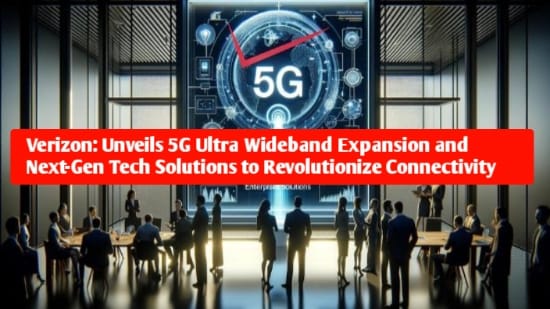Verizon Unveils 5G Ultra Wideband Expansion and Next-Gen Tech Solutions to Revolutionize Connectivity, 5G Ultra Wideband network has been at the forefront of the company’s
Verizon
Verizon, one of the largest telecommunications companies in the United States, has once again made headlines by expanding its 5G Ultra Wideband network to more regions and introducing innovative tech solutions aimed at enhancing user experience across multiple industries. This development marks a significant step forward in the company’s mission to deliver faster, more reliable internet services, alongside solutions that cater to modern business and consumer needs.
The 5G Ultra Wideband Expansion: A New Era of Connectivity
Verizon’s 5G Ultra Wideband network has been at the forefront of the company’s technological advancements, offering customers lightning-fast internet speeds, reduced latency, and the capacity to handle a larger number of connected devices. As of the latest announcement, Verizon has expanded this service to over 200 new cities and towns across the United States, bringing next-generation connectivity to millions of users.
This expansion comes as part of Verizon’s broader strategy to lead the 5G revolution, which has been dubbed as the future of mobile networks. With speeds up to 10 times faster than 4G LTE, the 5G Ultra Wideband offers transformative possibilities for sectors such as healthcare, education, and entertainment.
“Bringing 5G Ultra Wideband to more people means empowering businesses and consumers alike,” said Kyle Malady, Verizon’s Chief Technology Officer. “From smart cities to remote work solutions, 5G will enable applications and services that were once considered impossible.”
5G’s Impact on Key Sectors
Healthcare Transformation
The potential of 5G technology is perhaps most noticeable in the healthcare sector. With the network’s expansion, hospitals and clinics in more remote areas now have access to advanced telemedicine solutions, enabling doctors to conduct virtual consultations and surgeries with real-time precision. The low-latency capabilities of 5G Ultra Wideband also mean faster data transmission for medical imaging, allowing specialists to make quicker and more accurate diagnoses.
Verizon has already partnered with several healthcare providers to implement these technologies. In one pilot project, a hospital in Cleveland used 5G-powered virtual reality (VR) tools to simulate surgeries and provide training to medical students, showcasing the far-reaching benefits of high-speed connectivity in medical education.
Smart Cities and IoT
As 5G technology continues to expand, so too does its application in building smarter, more efficient cities. Verizon’s Ultra Wideband network is designed to support a wide array of Internet of Things (IoT) devices, from smart traffic lights to waste management sensors, making cities more responsive and environmentally sustainable.
Cities like Chicago and Los Angeles have already begun implementing Verizon’s 5G technology in their infrastructure. In these cities, traffic flow management systems, powered by 5G, are reducing congestion by predicting traffic patterns and adjusting light signals in real-time. Meanwhile, smart meters are being deployed to track energy and water consumption more accurately, helping residents and businesses reduce their environmental footprint.
Entertainment and Gaming
The entertainment and gaming industries are also expected to see a significant boost from Verizon’s 5G Ultra Wideband network. With faster download speeds and virtually no lag, gamers can enjoy seamless, real-time multiplayer experiences in games that require quick reflexes and high performance.
Additionally, Verizon is collaborating with media companies to bring augmented reality (AR) and virtual reality (VR) to the mainstream. As a result, 5G-enabled devices are set to offer more immersive experiences, from live sports broadcasts with multiple viewing angles to interactive movie experiences where viewers can engage with the storyline in unprecedented ways.
Verizon’s Innovations Beyond 5G: The Next-Gen Edge Computing
In addition to expanding its 5G network, Verizon is investing heavily in edge computing solutions, a technology that allows data processing to occur closer to the source rather than relying on distant data centers. This reduces latency and enables faster response times, making it ideal for industries that require real-time data, such as autonomous driving and industrial automation.
One key development in this area is Verizon’s collaboration with Amazon Web Services (AWS) to bring mobile edge computing to more markets. This partnership enables businesses to create new digital services and experiences that rely on ultra-low-latency connectivity, such as advanced robotics in factories or drones used for disaster relief operations.
“Edge computing is the future of digital innovation, and our partnership with AWS allows businesses to unlock new possibilities,” said Malady. “By reducing latency and bringing cloud services closer to the users, we’re creating faster and more efficient ways for industries to operate.”
Challenges and Competitive Landscape
Despite Verizon’s aggressive expansion of 5G and edge computing services, the company faces stiff competition from other major players in the telecommunications industry. AT&T and T-Mobile are both rapidly growing their 5G networks and introducing similar tech solutions. However, Verizon’s Ultra Wideband offering, particularly in densely populated urban areas, has been widely recognized for its superior speed and performance.
Another challenge facing Verizon and its competitors is the rollout of 5G infrastructure in rural areas. While urban centers have quickly embraced 5G, rural regions often lack the necessary infrastructure, posing difficulties in ensuring nationwide coverage. Verizon, however, has committed to overcoming this by focusing on partnerships with local governments and rural ISPs to ensure a broader reach of its services.
Verizon’s Vision for the Future
As Verizon continues to expand its 5G network and push forward with innovations in edge computing and IoT, the company is positioning itself at the forefront of the digital revolution. Its focus on providing cutting-edge technology to industries as varied as healthcare, education, and entertainment ensures that Verizon will remain a pivotal player in shaping the future of connectivity.
“5G is not just a network—it’s a platform for innovation,” said Malady. “By building the infrastructure that powers tomorrow’s technologies, we’re helping to create a future where everything and everyone is connected seamlessly.”
With continued investment in 5G Ultra Wideband and groundbreaking technologies like edge computing, Verizon’s role in the tech ecosystem will only grow stronger, driving innovations that will change how we live, work, and play in the digital age.
How did you like the information given in our article today, please tell us in the comment section and for more such posts, follow our page The News House, thank you
Reed more… TITANS SHOP: LAUNCHES AS A ONE-STOP DESTINATION FOR SPORTS FANS AND POP CULTURE ENTHUSIASTS


